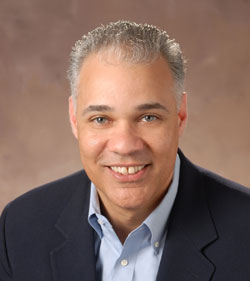 Carl St. Bernard ’86 knows he gets just one shot at this world. And he’s reminded of it every day as his company develops solutions that may give cardiovascular patients an option other than “sorry.”
Carl St. Bernard ’86 knows he gets just one shot at this world. And he’s reminded of it every day as his company develops solutions that may give cardiovascular patients an option other than “sorry.”
“If you have one more year with people you care about, what would you pay for that? What else would you spend money on? A new car? A new back porch? Or the next year having coffee with your father or mother and talking to them?” St. Bernard asks. “If that doesn’t get you out of bed in the morning, you need an ejector button.”
Those questions catapulted St. Bernard to the desk he occupies today as vice president of U.S. sales and marketing at Cordis Corp., a Johnson & Johnson company. Best known as the first to bring to market a coronary stent that emits a drug that retards clotting, Cordis rakes in $6 billion globally from the stent alone. At the helm of the company’s sales forces for just over a year, St. Bernard is energized by the technologies Cordis is developing.
“We’re really transforming cardiovascular care significantly,” he says. “[My challenge] is really to broaden the vision that we have for this business.”
Yet St. Bernard’s career in sales began with a simpler premise — his knack for socializing. At Lafayette, he says, he seemed to be in the center of diverse social environments both on the football field and within his fraternity, Delta Tau Delta. Despite the ’80s bustle on Wall Street, the economics and business major found finance too sterile, preferring the customer interaction he experienced during a summer job with a Long Island locksmith. Sales it would be. And as for the health care industry? St. Bernard’s college girlfriend was a pharmaceutical sales rep.
“I thought it was a cool job and a great industry. It hadn’t occurred to me that it would be better than selling detergent at the grocery store,” he says.
When St. Bernard entered the health care space, he reasoned he’d be doing some consulting, but hadn’t expected to be such an invaluable part of a hospital’s medical staff.
“The doctors looked to the rep to be the expert on the product,” he says, recalling his first time in the operating room watching a knee surgery, hoping he wouldn’t be sick. “A doctor works in one hospital, but he doesn’t know how a doctor in a different hospital works. Our sales teams know because they have a broad perspective of how the field works.”
St. Bernard worked his way through companies’ sales ranks from representative to division manager, tapping into the drug and medical device markets. While completing his MBA, he made a move to GE to work in the diagnostic equipment field in California. The “serendipitous” position he found in the Los Angeles Times, however, was not a managerial role; St. Bernard would be starting again as a sales rep.
“I didn’t see it as a demotion,” he says. “The likelihood of failure would go up moving from an orthopedic environment to diagnostic equipment for GE. If I did that at a manager level, boy, I could not understand my customers, competitors, market, and business issues. I’d have to learn on the job, and I’d have to deliver on a higher level. I could learn a lot more in a few years in the field than I could sitting in an office.”
It was a good gamble. A year into his time at GE, the new health care division head, a former salesman, approached him about positions at the Wisconsin headquarters. A newlywed with a baby and a house three blocks from Manhattan Beach, St. Bernard politely declined until a colleague intervened: “The big man just asked you to consider a job in Milwaukee — that doesn’t just happen.”
As GE’s U.S. sales manager, St. Bernard broke out of the sales role for the first time and was seen as a business leader for a commercial organization. He solidified the company’s largest MRI order at $25 million, and as sole provider for M.D. Anderson Cancer Center, St. Bernard watched GE work with the Texas hospital from blueprint stage to ribbon cutting — his two crowning achievements.
Thirteen years later, St. Bernard moved to New Jersey with his wife and two children to turn around Cordis’ sales division, taking on a leadership role in a company where no one knew him or his reputation. He had to learn the business while building employee relationships. It was a journey into self-awareness that harkened to his football tenure under former coach Bill Russo.
A wide receiver with a skinny frame but a bulk of high school accolades, St. Bernard realized in the first few practices that his schoolboy skills weren’t going to keep him on the team.
“Coach Russo said that what people had patted me on the back for was all going to end if I didn’t put in some hard work,” St. Bernard says. “For a 17-year-old, that’s a tough message to assimilate. But that’s what I ended up doing. Getting bigger, faster, stronger. It stuck with me at work after I graduated. Natural ability alone is never enough.”
 Carl St. Bernard ’86 knows he gets just one shot at this world. And he’s reminded of it every day as his company develops solutions that may give cardiovascular patients an option other than “sorry.”
Carl St. Bernard ’86 knows he gets just one shot at this world. And he’s reminded of it every day as his company develops solutions that may give cardiovascular patients an option other than “sorry.”